Text

For this final week of Tumblrs, I created multiple Austen-themed memes to have some fun and find my favorites for the final submission. I've used this first meme format before about a different Austen plotline, which demonstrates one character creepily staring at another while the partner next to them is visibly annoyed. This represents the Bennet staff's anger and apprehension of Baker's Wickham, who is predatory to Polly and Lydia. Wickham is significantly creepier in Longbourn than in Pride and Prejudice, and this leads characters to have much stronger reactions to him than Mr. Darcy's cold disapproval. This meme format applies to many of the Austen characters: it could be Polly looking at sweets, while Ms. Hill watches in disapproval or Ptolemy looking at Sarah, while Ms. Hill continues to watch in disapproval.
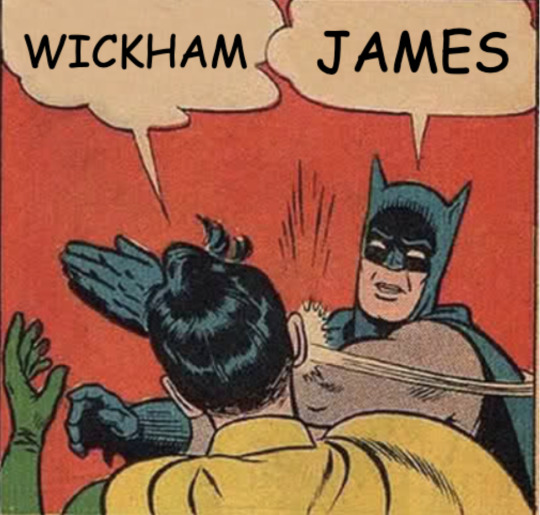
There are other entertaining moments in Baker's Loungbourne: James finally snapping and hitting Wickham across the face, or Ms. Hill musing about who would be a good couple between the serving staff. I found Baker's modern writing style more digestible, as I'm used to consuming it, but I also found it easier to find humor in. As I am familiar with how she communicates, none of her humor or irony went over my head like Austen's tends to do.
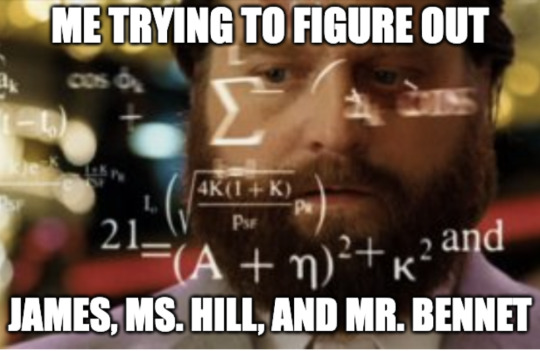
0 notes
Text

I believe this meme was created by a previous member of this class three years ago; however, I liked it so much I wanted to reuse it for this week's post. Created by @piesandprejudice, this graphic overlays two images from the show "The King of the Hill," where a character attempts to tell a group of non-English speaking students they are unable to understand. I scanned the original discussion for this meme but I didn't finish it as I was trying to avoid spoilers. I agree with the original author on multiple points: Longbourn may be my favorite book from this course, I absolutely love Sarah and the other characters, and I laugh at the rigid thinking of some of the most intense Jane-ites. The inability of the "Jane Austen Stans" to comprehend the message of Longbourn's superiority represents how set they are that any adjustements to their beloved story. This is easily visible for their disdain for any potential modernization of Austen, aka the Goodreads hatred of rock music in Mrs. Wickam, or adding new, potentially unflattering, perspectives of the precious Bennet sisters.
This meme also represents my immediate love for Longbourn: my favorite style of classic novel adaptation. After watching Lost in Austen, I was attempting to pinpoint why Amanda’s role in the plot bothered me to such an extent. I realized that I enjoy new characters in stories when they flesh out and add dimension to the existing scene, not when they completely replace an existing character. I have never quite daydreamed myself exactly as Elizabeth Bennet, but rather someone of similar social standing who may be having the same story with... Mr. Darcy’s twin brother. This is why Longbourn is so attractive to me: it adds more content to Austen’s base plot without disrupting her existing character dynamics. Additionally, Austen is known for her limited exposition and description of setting. Longbourn is an opportunity to expand and imagine this setting, adding detail and color into the Bennet’s previously shallowly-imagined home.
1 note
·
View note
Text

This image collage was posted to Reddit by @michmemoirs (not sure if the same Tumblr profile), who highlights a scene in Bridget Jones' Diary where Mr. Darcy proclaims that he likes Bridget "just as you are." While the romanticism of this moment may be enhanced by the fact that Colin Firth is saying it, as many things in the Austen universe tend to be, I enjoyed how this meme contrasted much of our class discussion today. We discussed how Bridget Jones is a "flat" or "blobby" character, one who is easily reduced into caricatures or just vapid mirrors of actual people. While I generally agree with this point, having added that she seems like someone has "skimmed the top off a real person," I enjoyed the idea that we were playing into the hands of Helen Fielding/90s chick flick reflections: hating on Bridget Jones for being a vapid mess, when she could have value solely existing that way.
The setting of the 1990s is full of shallow media that is reflected in Bridget's mannerisms: comments on men in her life, judgment of her weight, and how she approaches alcohol and dieting, etc. This is often hyped up for comedic effect; however, we were quick to lay sole blame on Bridget herself, instead of the cultural expectations of the decade she was living in. When reflecting on her actions during the novel, even though she doesn't always enjoy these facts about herself, Bridget retains her own apartment, identity, group of friends, moves jobs, and holds some level of confidence throughout the novel. By Colin Firth declaring that he likes Bridget exactly for who she is, this collage sparks reflection that perhaps we should stop solely judging her for being flat at first glance and maybe look for why she was so enrapturing to women in the 90s (and to Colin Firth too).
1 note
·
View note
Text
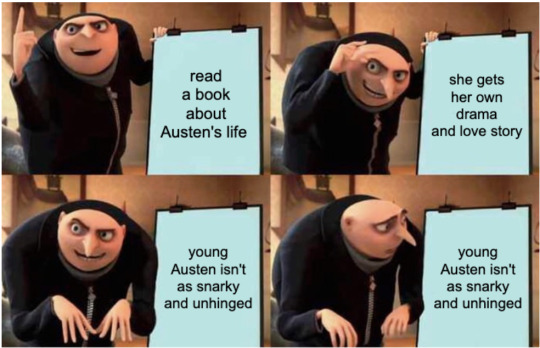
For this week, I created an original meme that reflects on my love for Austen’s clever and witty language throughout her novels. Although I do not want to come across as completely disliking Secrets in the Snow, I was underwhelmed by MacColl’s depiction of Austen. This novel is set when she is 19 years old, still eligible for marriage, and portrayed with a younger personality and temperament. I was unsure why I felt like MacColl’s writing style was missing something important until I realized that her younger target demographic meant that Austen’s pure snark could not truly show itself. I understand that lines like “He was not an ill-disposed young man, unless to be rather cold hearted and rather selfish is to be ill-disposed,” might not provide the narrative of kindness you would expect in a children’s book, but they are honestly one of my favorite parts of Austen’s writing. This reflection has led me to understand how Austen’s ability to represent characters in just a few words, often in an unkind light, brings such enjoyment and depth to her work.
The meme above uses the character Gru from Despicable Me as he explains some nefarious plan, but he is taken aback by the last step. This is often used to depict when people are confused by their original plan not ending how they expected - as with myself and my unexpected lack of enjoyment of Secrets in the Snow. I was so ready to enjoy a book where Austen would get to shine and experience the love story she wrote for all of her characters and was shocked when it wasn’t what I expected. I also created an additional meme I’ll place below, where a man is ignoring his girlfriend for a more appealing woman walking toward the camera. This also represents my newfound realization that maybe I am just no longer nice enough to read YA fiction, and need mean characters in my life.
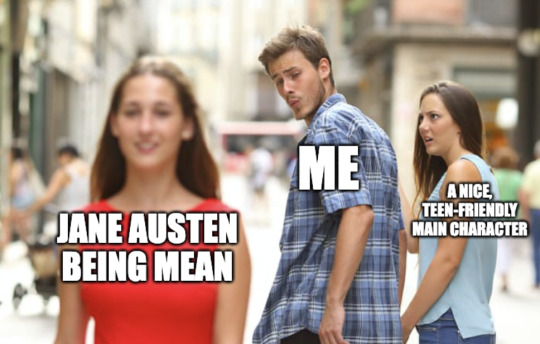
1 note
·
View note
Text

This week’s tumblr is a Jane Austen meme, but instead of being an Austen take on a traditional comic format, this image actually became the basis of memes for many other forms of media. The webpage “Know Your Meme” cites its origins from Kate Beaton's webcomic Hark! A Vagrant, titled "Ooh Mister Darcy". (Kate Beaton's other works are often featured on class powerpoints!). It depicts Mr. Darcy coming home to Elizabeth, hyperbolically commenting on his open shirt, cravat, and looks, and everyone in “a 20-mile radius” subsequently being overwhelmed with love for Mr. Darcy. This comments on the Darcymania of the Jane Austen fandom and their obsession with his impact as a male lead. After reading multiple pieces of fanfiction, watching Amanda Price’s sexualization of her Mr. Darcy, and reflecting on the idolization of Mr. Darcy as the ultimate “I can fix him,” man of the 20th century, this comic quickly portrays this fictitious impact. Just the act of Mr. Darcy and Elizabeth together creates a 20-mile radius of "bodices ripping" and "men turning gay."
This meme/comic is repurposed for other fandoms by them each replacing these characters with their main romantic leads, with Mr. Darcy becoming their respective heartthrob. Mr. Darcy acting as the ultimate and original bodice-ripper is an interesting connection to Amanda Price's statement that his is the ultimate love story. It may be an overstatement to suggest that Mr. Darcy is truly the number one love interest in all pop culture, his impact serving as the basis for many a character demonstrates the importance of his reputation.
1 note
·
View note
Text
For this week's meme I chose a post from @stars-in-the-storm, who represented the "plot" of Pride and Prejudice with a screencap of Mr. Darcy's hand flex. This specific moment wasn't written by Austen, but instead improvized by Matthew Macfadyen in the 2005 remake. It serves as an apt symbol of the "Darcy-mania" that takes over tumblr and most of the internet: this user is watching P&P just for Mr. Darcy's moments. Whether it is the movie's over-dramaticized confessions of love ("you have bewitched me, body and soul, and I love--I love--I love you.") or their thirst-trap portrayals (hello hand flex Macfadyen or wet shirt Colin Firth), the movies add kindling to the fire of internet Darcy-mania, which this post quickly isolates. Although perhaps not their intention, the poster here highlights the difference between story and discourse in Austen's adaptations.
The story of Mr. Darcy's love for Elizabeth Bennet remains the same: they meet and form false first impressions, Mr. Darcy's feelings are brewing underneath the surface, a rejected first proposal, and a later acceptance. The actual events that happen are constant; however, the discourse of how this story is told is wildly different. In Austen's novels we are told Darcy's emotions but they are often cold and detached, and he is often abrasive when he speaks to Elizabeth. The discourse in the movie adaptations chooses a more warm and intense interpretation, giving Darcy more romantic characterization, whether that is through dramatic confessions of love or the occasional transparent clothing item. The theory of narratology provides perhaps a deeper background to @stars-in-the-storm's post: maybe they were instead alluding to their selection of Macfadyen's discourse choices of Austen's Pride and Prejudice.
I watch pride and prejudice for the plot
The plot:
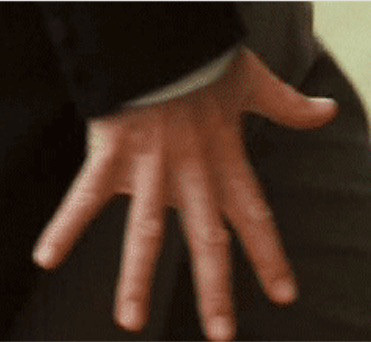
611 notes
·
View notes
Text
For this week's post about Pride and Prejudice, this meme by @janefrigginausten plays on a scene in Volume One, Chapter 19, where Mr. Collins repeatedly refuses to take Elizabeth Bennet's refusal as a genuine answer. You may think the original tweet author, Sparknotes, exaggerates Mr. Collins' inability to accept Elizabeth's response, but in the novel, he states, "I therefore conclude that you are not series in your rejection of me, I shall chuse to attribute it to... ...the usual practice of elegant females." By responding to Elizabeth's denials with reflections on women's apparent need to say no multiple times before they admit to wanting something, he effectively demonstrates his lack of social awareness and achieves pissing the reader off. Immensely.
The implied response for this meme is, "Yeah, I sure hope it does!" The man pictured above says this phrase after reading a sign labeled "road work ahead," revealing his comic misunderstanding of the sign's intent. This effectively parallels Mr Collins' misconception of Elizabeth's true intention through her refusals. If someone in Austen's world wanted to use this meme, they may have highlighted the sarcastic interplay between Mr. and Mrs. Bennet. The author of this meme chose to remove the beginning sequence and only imply "Yeah, I sure hope it does," cutting out where the man reads "road work ahead." This is effective for this situation, but another opportunity to repurpose this meme could have been to have an Austen character recreate the entire sequence. One of the younger Bennet sisters, Mr. Collins, and Mrs. Bennet all have the characterization to humorously make a similar mistake with the sign's intention. Austen presents each of them misunderstanding other characters' words about music recitals, marriage proposals, or their nerves, and this meme would fit this theme of reduced awareness and comic misconceptions.

23 notes
·
View notes
Text
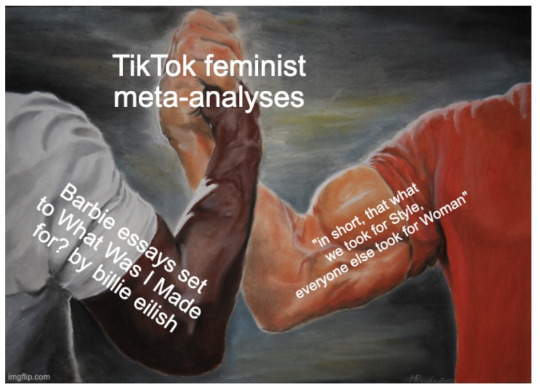
This week, I created my own meme based on "Jane Austen, or the Secret of Style," by D. A. Miller. I highly enjoyed this reading, especially the focus on the relationship between femininity and who/how one consumes media. I would confidently say that most women can illustrate the first time they realized they felt observed or monitored solely for their gender, a moment Miller catches when she notes "the quite different experience of being read reading [Austen.]" Miller goes on to detail the complicated relationship between adulthood, maturity, and public opinion as a girl grows into womanhood. While I find this genre of reflection incredibly relatable and poignant, it is also one I frequently came across this summer: post-Barbie release TikTok.
All throughout the internet, primarily young women were analyzing the feminist, cultural, and activist themes within Greta Girwig's blockbuster; creators isolated relatable dialogue, analyzed men's (often negative or dismissive) reactions to the movie, and connected Girwig's movie to experiences they had in their own lives. I have often seen similar reflections during our in-class discussions when we remark on the relatability of Austen's character dynamics or declare ourselves firm Lucy Steele apologists. If these women read Miller's work, they would love to incorporate it into their writing. One interesting facet was the format of these essays: in (often hot-pink) font on top of Billie Eilish's single What Was I Made For? I threw some examples in the notes. This allowed creators to follow the trend and reach the same audience, but it also created a space for them to analyze their childhood experiences or how they saw the impact of "Barbie" on different groups. I think Jane Austen would have enjoyed some of these TikToks: many follow similar themes to her Chapter 5 rant in Northanger Abbey. The meme I chose above shows two arms meeting in a handshake to represent a similar quality they share. This simply demonstrates the thematic connection between Miller's writing and the summer TikTok trend; however, Jane Austen may have used it to link Isabella Thorpe and Lucy Steele, or maybe even Marianne and babe Annamarie, with acting like a child.
2 notes
·
View notes
Text
i need to stop spoiling S&S for myself on tumblr

original image from @firawren
For this week, I selected this meme about emotional manipulation, because of how Austen demonstrates multiple methods that her characters like to trick/twist each other. I was very entertained by her use of letters in manipulation, as I mentioned in class, particularly by Lucy sending a letter to Elinor. In this letter, it is clear that she really wants the known gossip, Ms. Jennings, to read her words - something that Elinor quickly realizes and thinks about. By using this method to spread positive information about herself, Lucy can gain power back while still holding to high society rules of conduct.
Additionally, Willoughby is manipulative in both his letter to Marianne and during his conversation with Elinor. Although some may take this moment to give Willoughby credit for being swept up in his emotions, I still think he's just messing with young women. This is evident in how Austen notes that Elinor oscillates between feeling soft and irritated with Willoughby throughout his speech, as he attempts to gaslight her (and Marianne) that he only had good intentions.
This meme uses a similar format as last week's with a text post placed on a still image from the movie adaptation of Sense and Sensibility. This suggests that one of the sisters is saying the phrase "he was the gas to my light...", which is especially entertaining when you impose more modern language onto traditional characters. I definitely believe Marianne would be a firm believer in "gaslight, gatekeep, girl boss" if she were living in 2024. By writing "gas to my light" and "man to my ipulation," the author is playing on the words gaslight and manipulation, articulating that this is something they liked/associated with this person. This also connects to Marianne, as I believe that she recognizes how Willoughby is perhaps too intense and flighty with his emotions, but she holds feelings for him anyway.
1 note
·
View note
Text
Marianne and I have a lot in common

Credit to @firawren for the original text post
I selected this text overlay for the beginning of Sense and Sensibility because it provides an apt observation of Marianne's initial personality and a quick laugh about her often hyperbolic characterization. Marianne is the intense, emotional, and expressive counterpart to Elinor's "sense" and internal control. The younger sister often makes remarks without thinking, openly expresses her emotions, and reacts with tears, screams, and tantrums to many moments in her life. Notably, upon receiving her final (final?) letter from Willoughby, she enters into a multi-day episode of tears, melancholy, and at one point screams into a pillow. I interpreted Austen's portrayal of her behavior as lightly mocking, as she never hesitates to compare Marianne's turbulent emotions to her mother's, or repeatedly emphasize the rapid nature of her moods.
I particularly enjoyed this text overlay because Marianne truly does have beliefs, and she will express them. Although the original author, @fairycosmos, may have been joking when she said "agree with their beliefs," Marianne is firm in her nature and does not apologize for her excesses of emotion. Even when she observes others around her experiencing intense emotion, like Elinor's reunion with Edward Ferrars, she herself will burst into tears in commiseration. Like a young child, she feels her own emotions, and those around her, with high intensity and no urge to repress them. Honestly, I also often feel like a toddler and would like to burst into tears. I admire some of Marianne's tenacity.
Lastly, this particular image made me giggle because it aptly connects to the link between baby "Annamarie" and older "Marianne." The often screaming child is compared to Marianne in name, but this image brings the childlike nature of Marianne's behavior into clarity. Just like how this meme uses text overlays to pretend a character is saying the phrase/associating with a joke someone made in a different context, I enjoy how Austen uses Annamarie's name to showcase Marianne's behavior in a different setting.
1 note
·
View note
Photo
I decided to use this meme for my first post because I thought it was a nice introduction to Jane Austen meme culture (and my slight adolescent addiction to Glee). Additionally, I was trying my hardest to avoid spoilers for the second half of Northanger Abbey, fairly unsuccessfully. So far, Austen's introductions to the characters of Northanger Abbey have been entertaining and a little weird. I've enjoyed seeing the similarities between her Juvenilia writing and her characters now: more realistic descriptions but with remnants of her early spunky humor. When she wrote that Catherine's father is "a very respectable man, though his name was Richard" or went on a spiel about the "remarkable" nature that her mother was still alive, I was humored by her choice to include these jokes in the very first page of her novel.
This meme is entertaining because Austen's first portrayal of Mr. Tilney is very descriptive of his fabric knowledge, without any real explanation of why. My initial reaction was to think he would only be present for comedic relief, without a substantial role in the story. Austen's choice to have Tilney immediately begin teasing Catherine about the "proper attentions of a partner" made me believe he may act instead as her guide to life in Bath rather than a romantic interest. Through my short perusal of the internet's opinions of her romantic characters, I've seen many references to how she often decides to make them have many good and some weird qualities. I'm excited to read more of Northanger Abbey, and more of Austen's characters, to see how her choices develop!

Jane Austen writing Northanger Abbey
1K notes
·
View notes